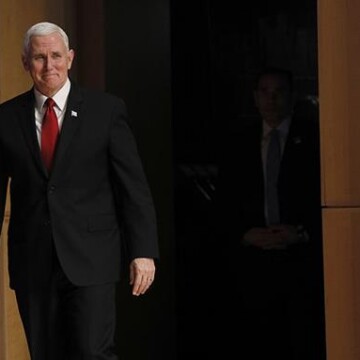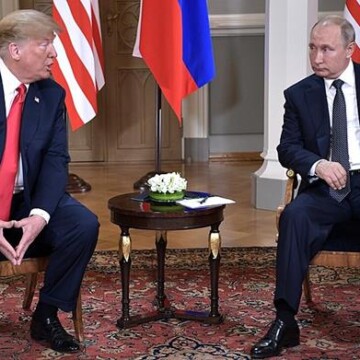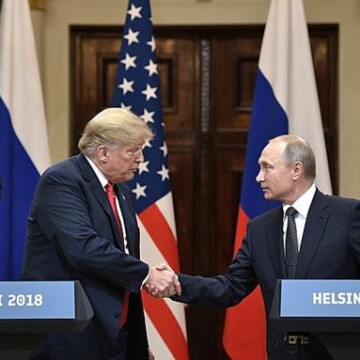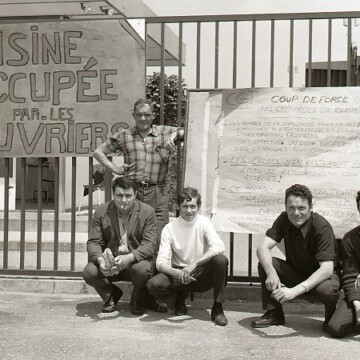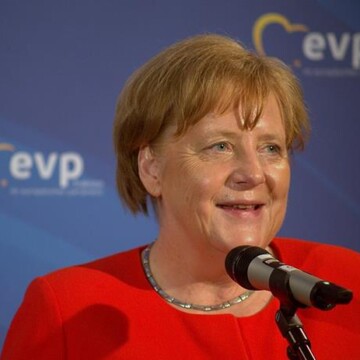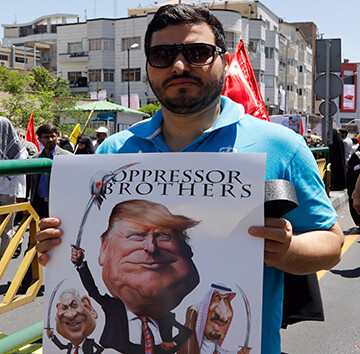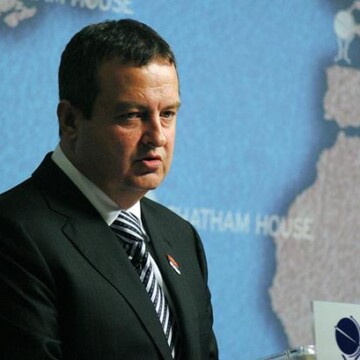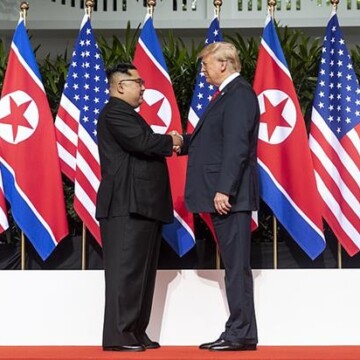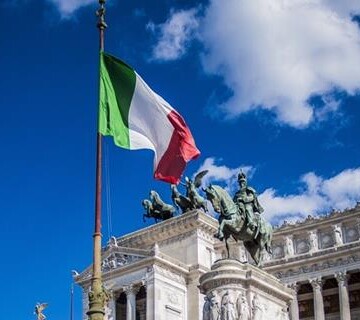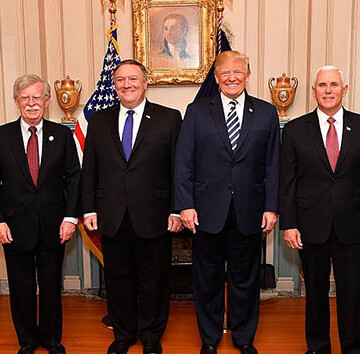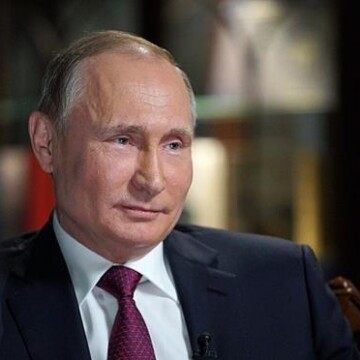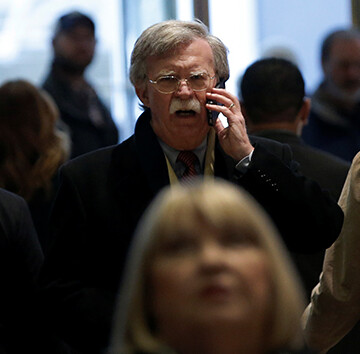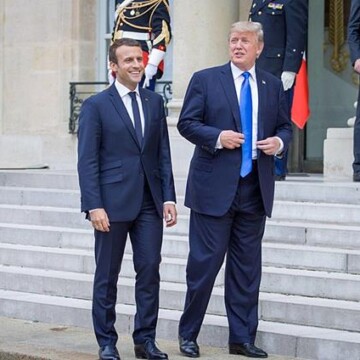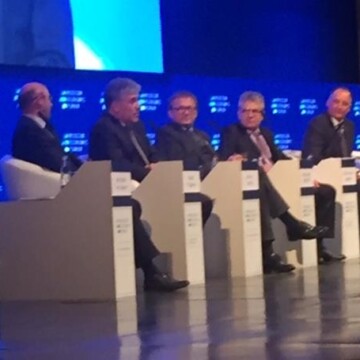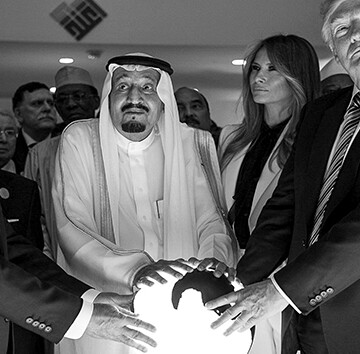On July 26 Vice President Michael (“Mike”) Pence addressed the first “Ministerial to Advance Religious Freedom” in Washington D.C. Pence opened his remarks by asserting that “religious freedom is a top priority of this administration,” that this “most fundamental of freedoms . . . is in the interest of the peace and security of the...
Author: Srdja Trifkovic (Srdja Trifkovic)
Trump in Helsinki (II): A Long View
Five days after the Helsinki summit I am inclined to believe that President Donald Trump either knows exactly what he is doing—that there is uncanny finesse and foresight behind his bluster—or else that he is guided by an almost unfailing intuition, with similar results. Trump’s refusal to parrot the Intel-deepstaters’ “Russiagate” narrative at last Monday’s...
Trump in Helsinki: The Score (I)
The hysterical media/establishment/Deep State reaction to President Trump’s comments in Helsinki is based on a lie. U.S. intelligence chiefs, current and former, fire back at Trump—a sample offering from the NPR—quotes Director of National Intelligence Dan Coats as saying the U.S. intelligence community has been “clear in our assessments of Russian meddling in the 2016...
Toxic Legacy of 1968
In the spring and summer of 1968 a wave of student protests erupted on both sides of the Atlantic Ocean. Their immediate causes were different, but they had two significant common features: contagious denial of the legitimacy of authority and a distaste for established norms of behavior and thought. The process was spiritually comparable to...
Merkel’s Fading Star
For many years German Chancellor Angela Merkel has been regarded, with reason, as the most powerful woman in the world. Over the past few months Merkel’s authority has diminished precipitously, however, mainly due to her irrational immigration policy. That much became obvious at last weekend’s emergency EU summit on immigration. The meeting was hastily convened...
Trump’s Iranian Gamble
The conventional view among antiglobalist conservatives is that President Donald Trump’s nixing of the Iran nuclear deal, coupled with the much-heralded relocation of the U.S. embassy to Jerusalem, is bad news. Their arguments are clear. America seems to be moving closer to another war of choice in the Middle East—potentially far more costly and devastating...
Islamic Migratory Onslaught in the Balkans
On June 20 Serbia’s foreign minister Ivica Dacic made an interesting remark in connection with the ongoing political and territorial dispute over the status of Kosovo. We are witnessing a new reflection of the desire to create the “green transverse” in the Balkans, which is a “dangerous fantasy” motivated by ambitious Islamic extremism. “This is...
Trump-Kim Summit: The Score
At the end of their meeting in Singapore, President Donald Trump and North Korea’s Chairman Kim Jong Un signed a document in which Trump “committed to provide security guarantees to the DPRK,” while Kim “reaffirmed his firm and unwavering commitment to complete denuclearization of the Korean Peninsula.” In principle this is a reasonable formula which...
Italy’s “Populist” Government
In Italy’s general election on March 4, two parties routinely derided by the corporate media as “populist” won almost 70 percent of the votes cast. A coalition led by Matteo Salvini’s League (Lega, formerly known as Lega Nord, LN) won 37 percent of the vote and a plurality of seats both in the Chamber of...
Syria: A Deep State Victory
The latest escalation of the Syrian crisis started with the false-flag poison gas attack in Douma on April 7. It was followed a week later by the bombing of three alleged chemical-weapons facilities by the United States, Britain, and France. The operation had two objectives. The first was the Permanent State interventionists’ intent to reassert...
American Overstretch: The Good News
Imagine you are a denizen of Melos enslaved by the Athenians during the brutal sack of that island in 416 BC. A year later you learn that your masters are preparing a massive expedition to Sicily as a starting point for the conquest of Italy and Carthage; and, furthermore, that they are hoping that the...
Putin’s Collapsing Credibility (Updated)
Tens of thousands of Armenians converged on the capital Yerevan on Wednesday morning, blocking roads and government buildings in protest over the ruling party’s reluctance to transfer power in the country to opposition leader Nikol Pashinyan. Protesters said they would stay on the streets for as long as it takes to oust the ruling Republican...
Worse Than a Neocon
Until March 22, when the White House announced that John Bolton would replace H.R. McMaster as national security advisor, it was still possible to imagine that President Donald Trump’s many compromises with the globalist-hegemonist establishment had been made under duress. This may have been true once, but it is not true now. Bolton’s appointment indicates...
Macron in Washington
French President Emanuel Macron’s three-day visit to Washington started on an awkward note when he kissed an obviously uncomfortable President Donald Trump. The scene was a symbolic reminder that the two leaders do not enjoy an “intense, close relationship” invented by the media. In reality Macron is, both ideologically and temperamentally, the polar opposite of...
Théâtre Syrien
There are several conflicting narratives on who is doing what to whom in Syria, and why. That a false-flag operation was followed by an act of aggression by the U.S. and its European satellites is clear. Everything else is murky. Three initial impressions deserve particular attention. 1. False flags work if they are supported by...
The Moscow Manifesto
Yesterday’s two panels on world affairs at this year’s Moscow Economic Forum raised issues that are well outside the permitted mainstream discourse in the West. As a German colleague remarked, “only here I meet people who are not focused on the disjointed, piecemeal fragments of reality, who have no doubt that the Chinese or Persian...
Moscow Notes: The Curse of Liberalism
The first day of this year’s Moscow Economic Forum (MEF, April 3-4), the premium gathering of Russian and foreign business leaders, economic strategists and geopolitical analysts, started with a plenary session reminiscent of the opening of last year’s event. Speaker after speaker complained that President Putin has no coherent strategy for Russia’s comprehensive development, and...
Fiddling on the Brink
A standard theme in the literature on the Great War is that hardly anyone expected it at the time. Europe’s last summer, balmy and idyllic, suddenly brought the guns of August. This view is not historically accurate—Germany willed the war, and her leaders engineered the July crisis—but for most other actors the catastrophe did come...
A Forgotten Centennial: The Treaty of Brest-Litovsk
Last week saw one-hundredth anniversary of an event which greatly impacted the destinies of Europe and America for decades to come. It passed unnoticed by the media. On March 3, 1918, the Bolsheviks signed a peace treaty with the Central Powers at Brest-Litovsk. Far from sealing the Kaiserreich’s historic triumph in the East, its brutal...
The Middle East: The Current Score
“Peace in the Middle East” is like the unicorn: we can envisage the beast, paint it in detail even, but we can’t groom a living specimen. The problem transcends geopolitics and ideology, it is also metaphysical. The people inhabiting the region are vying for limited resources, such as land and water. In addition, many also...
Putin’s New Weapons
The most interesting part of President Vladimir Putin’s two hours long state of nation address on March 1 was his announcement—accompanied by a video presentation—that Russia has developed a hypersonic state-of-the-art missile 20 times faster than the speed of sound, as well as a nuclear-powered cruise missile, both supposedly safe from interception. Putin claimed that...
Hawks Win
The Pentagon’s National Defense Strategy, which Defense Secretary James Mattis presented on January 19, envisages aggressive measures to counter Russia and China and instructs the military to refocus on Cold War-style competition with them, away from terrorist threats and “rogue nations.” This is in stark contrast to Barack Obama’s 2014 Quadrennial Defense Review, which called...
Letter From Lebanon: The Phoenician Phoenix
“For thousands of years, the land that carried the mountains of Lebanon and hugged the Mediterranean Sea was restless,” says painter Antoine G. Faddoul of his Phoenix as a metaphor for his native land. “Those who inhabited the very first civilized cities suffered numerous invasions destroying their cities time and again [but] the survivors always...
An Undereducated Admiral
Since there are no pressing global issues that cannot wait until next week, I’ll devote my column to a book I’ve just finished reading. Its title, Sea Power: The History and Geopolitics of the World’s Oceans (Penguin, 2017), and the reputation of its author—retired admiral James George Stavridis, who ended his career as NATO Supreme...
Neocon Security Strategy
Devising a great power’s national-security strategy is serious business. When external challenges are properly evaluated, tasks prioritized, and resources allocated, the results can be impressive. The Roman Empire from Nerva to Marcus Aurelius (a.d. 96-180) provides one example; Britain from Napoleon to the Great War another. The rise of Prussia and unification of Germany during...
A Promising Year
On this month’s form, 2018 will be an interesting year. So far it has brought rich rewards to us world affairs aficionados. The overall global tempo is accelerating, affrettando, like de Falla’s Danza Ritual del Fuego. What would have been considered bizarre if not outright insane but a few years ago is now commonplace. Take...
Letter from Germany (II): The Duopoly Is Back
You can read Letter from Germany, Part I here. This past week has been unseasonably lovely in southern Germany, with crystal blue skies and the temperature in the fifties. I was enjoying the view of the Alps from the southern wing of Neuschwannstein, the famous fairytale castle built by Wagner’s mad friend King Ludwig, when...
Letter from Germany: Westphalia in Winter
The North German Plain is not an exciting place. It lacks the charm of the Palatinate, the fairytale quality of the Middle Rhineland, or the drama of the Bavarian Alps. It is peopled by staid burghers who are hard-working, practical, and (in contrast to the Oberpfälzers, say) rather quiet. It rains a lot, and now...
Trump’s First Year
A key source of volatility in today’s international system is the propensity of the U.S. government to reject any conventionally ordered hierarchy of American global interests. Washington’s deterritorialized policy of full-spectrum dominance is based on ideological suppositions that are unreceptive to rational debate. America’s “global engagement” constantly creates results—notably in Iraq and Libya—that run counter...
Warsaw vs. Brussels
On December 20 the European Commission (EC) took the unprecedented step of activating Article 7.1 of the Lisbon Treaty against Poland. The EC accuses the Law and Justice (PiS) government in Warsaw of “putting fundamental democratic rights at risk” by enacting 13 laws to reform the country’s judiciary which make it easier to replace the...
The Impossibility of a Lasting Arab-Israeli Peace
President Donald Trump’s decision to recognize Jerusalem as the capital of Israel and to move the U.S. Embassy from Tel Aviv to the Holy City has been criticized on many grounds, most of them ostensibly sensible, in America and abroad. In the Western media, over the past two days, we have encountered six chief objections:...
Letter from Croatia: Remember Yugoslavia?
Exactly ninety-nine years ago—on December 1, 1918—the Kingdom of Serbs, Croats and Slovenes came into being. A decade later its name was changed to Yugoslavia. A generation ago the country disintegrated in blood and acrimony. The unification of Serbs, Croats and Slovenes came several decades too late. Had it happened during the era of Germany’s...
Whither Europe?
That Europe is in mortal danger from the ongoing, overwhelmingly Muslim immigrant deluge and from its ruling elites’ spiritual degeneracy is beyond dispute. This phenomenon of world-historical significance has several causes, but the most important one is in the divorce of reason from faith. As a result, post-Christian Europe is rapidly sinking into self-destruction. The...
“Indo-Pacific”: Meaning, Implications
A week after President Donald J. Trump’s return from his 12-day tour of Japan, South Korea, China, Vietnam and the Philippines, its fruits are uncertain. Trump called the trip “very epic.” On the other hand, the media and establishmentarian analysts have predictably declared that he has failed to achieve anything significant. Joshua Kurlantzick of the...
A Grim Centennial
Exactly one hundred years ago—in the early hours of November 7, 1917—the Bolsheviks staged a successful coup d’etat in Petrograd. “The main operations began at 2am,” Leon Trotsky remembered five years later. “Bolshevik groups occupied the rail stations, the lighting station, military and food warehouses, the water systems, the Palace bridge, the telephone exchange, state...
China: Xi in Charge
In the aftermath of last week’s finale of the Communist Party of China’s (CCP) 19th congress, many commentators have opined that President Xi Jinping is now the country’s most powerful leader since Deng Xiaoping. This is incorrect. Xi is the most powerful leader since Mao Zedong at home, and arguably the most influential Chinese player...
The Birth of National-Globalism
Following President Trump’s maiden speech to the U.N. General Assembly on September 19, ideologically incompatible analysts have found similar reasons to cheer or condemn the 40-minute oration. To Breitbart’s Adam Shaw it was a powerful, nationalist, full-throated defense of Trump’s “America First” agenda. To the far more numerous Trumpophobic pundits—like the Chicago Tribune’s David Rothkopf—it...
AVOIDING THE IRANIAN QUAGMIRE
On October 13, President Trump declared that the only way to stop Iran from obtaining nuclear weapons was to abrogate the multilateral treaty which has been provenly effective in preventing Iran from developing such weapons. This is potentially the most serious mistake of his foreign policymaking thus far. According to Trump, “the longer we ignore...
A Tale of Two Referendums
Over the past nine days two important referendums on independence were held, in Iraqi Kurdistan (September 25) and in Catalonia (October 1). Both were met with overwhelming disapproval of the outside world. In both cases the local authorities—in Erbil and Barcelona respectively—had a short-term political agenda other than the stated grand objective. That is where...
A Tale of Two Revolutions
A hundred years ago, in the early hours of November 7, 1917, the Bolsheviks grabbed power in Petrograd. Within weeks they took advantage of Russia’s collapsing political and social structure to impose control over the country’s heartland. The result of the coup was a tragedy of world-historical proportions. A vibrant, flourishing culture (see “Remembering the...
Merkel’s Mutilated Victory
German general elections are usually rather boring affairs, with polite debates, disagreements over minor issues and predictable outcomes. The one last Sunday was an exception. It was interesting not because the incumbent, veteran “center-right” Chancellor Angela Merkel (a nominal Christian Democrat), and the “center-left” opposition leader Martin Schulz (a nominal Social Democrat) differ on any...
Kim’s Challenge
[Credit: By Roman Harak (North Korea – Kumsusan) [CC BY-SA 2.0]] As President Trump makes his UN General Assembly debut this week—the body he has rightly called weak, incompetent, bad for democracy, and no friend of the United States—North Korea still dominates the headlines. It presents a problem in need of sober management. While it is...
Rumors of War
By the seventh month of Donald Trump’s presidency a surreal quality to U.S. foreign policy decision-making had become evident. It is at odds with both the theoretical model and historical practice. When we talk of the “behavior” of states, what we have in mind is the process of decision-makers defining objectives, selecting specific courses of...
The Unmaking of a President
The aftermath of the Cold War has seen the emergence of what neocon gurus Robert Kagan and William Kristol have called “benevolent global hegemony” of the United States. Throughout this period, key figures of both major parties have asserted that America’s unchallengeable military might was essential to the maintenance of global order. This period was...
Trump on Afghanistan: More of the Same
President Donald Trump’s address to the nation on Afghanistan was carefully crafted and well delivered. It did not provide a blueprint for winning the war, however, which remains his stated objective. Trump has settled for a compromise between all-out escalation, advocated by some of his generals, and the disengagement he had favored on the campaign...
Netanyahu’s Woes
For many scandal-plagued politicians there comes a turning point after which the downfall becomes inevitable. In Richard Nixon’s case this happened on March 1, 1974, when he was named as an unindicted co-conspirator in an indictment against seven former presidential aides. Two months later, impeachment hearings commenced before the House Judiciary Committee. Charles Haughey’s illustrious career as...
ISIS: Trump’s Unheralded Success
Considering the unprecedented obstacles President Trump is facing from various quarters in his attempts to devise a coherent foreign policy strategy (see my column in the September issue of Chronicles), the apparent success of his anti-ISIS approach thus far is both surprising and encouraging. It shows that realist pragmatism yields results. Over the past six...
Travel Ban, and Beyond
The Supreme Court decided on June 26 to allow key parts of the Trump administration’s “travel ban” to go into effect temporarily. This was an unexpected victory for the President—and for common sense. Until the Court hears the full case in October, the administration will be able to bar travelers from six majority-Muslim countries who...
U.S.-Russia: A Glimmer of Hope
Considering the toxic Russophobic atmosphere nurtured by the Beltway establishment, the first meeting between presidents Donald Trump and Vladimir Putin last Friday went reasonably well. Contrary to the mainstream media pack’s predictions and predictable post mortems, there were no “winners” or “losers.” The encounter was not perceived by its principals in terms of zero-cum game....
Wahhabism First
President Donald Trump started his first foreign tour on May 20 in Saudi Arabia. His two-day visit was punctuated by a series of embarrassingly poltroonish statements and gestures to his hosts. It culminated in a macabre sabre-rattling spectacle, the moral equivalent of tossing Zyklon B canisters into a Silesian compound in 1944. For his part,...
